“They had no weapons, nothing.” The stories of seven men who were killed by Russian invaders in Peremoha
Peremoha, which means "Victory", is a village in the Brovary district of Kyiv Oblast. After the start of the full-scale war, the Russian army advanced on Kyiv, capturing the region's populated areas along the way. Russian troops entered Peremoha on 28 February 2022.
In the first few days of the occupation, they executed seven men in the basement of a local post office in the centre of the village. Here we tell the executed men's stories and describe the murder investigation and how the victims are commemorated.
This article was prepared by the Memorial memory platform, which tells the stories of Ukrainian servicemen and civilians killed by Russia, exclusively for Ukrainska Pravda. To report information about Ukrainian losses, fill out the forms: for civilian victims and military victims.
"He ordered only Ukrainian products for his store"
The post office in Peremoha operated inside a hardware store belonging to Yaroslav Dziubenko, 37.
It was aroslav's idea to open it, and he served the customers himself.
Advertisement:On the first day of the full-scale war, Yaroslav got together with other men from the village and offered to make his store the territorial defence headquarters. "He was a great patriot," says Yaroslav's mother, Valentyna. "He ordered only Ukrainian products for his store. During the Revolution of Dignity, he was constantly at the Maidan.
He loved the Ukrainian language." Before the village was occupied, the members of the self-organised territorial defence group kept order in Peremoha and made Molotov cocktails in anticipation of the invaders. Yaroslav's parents would bring them food.
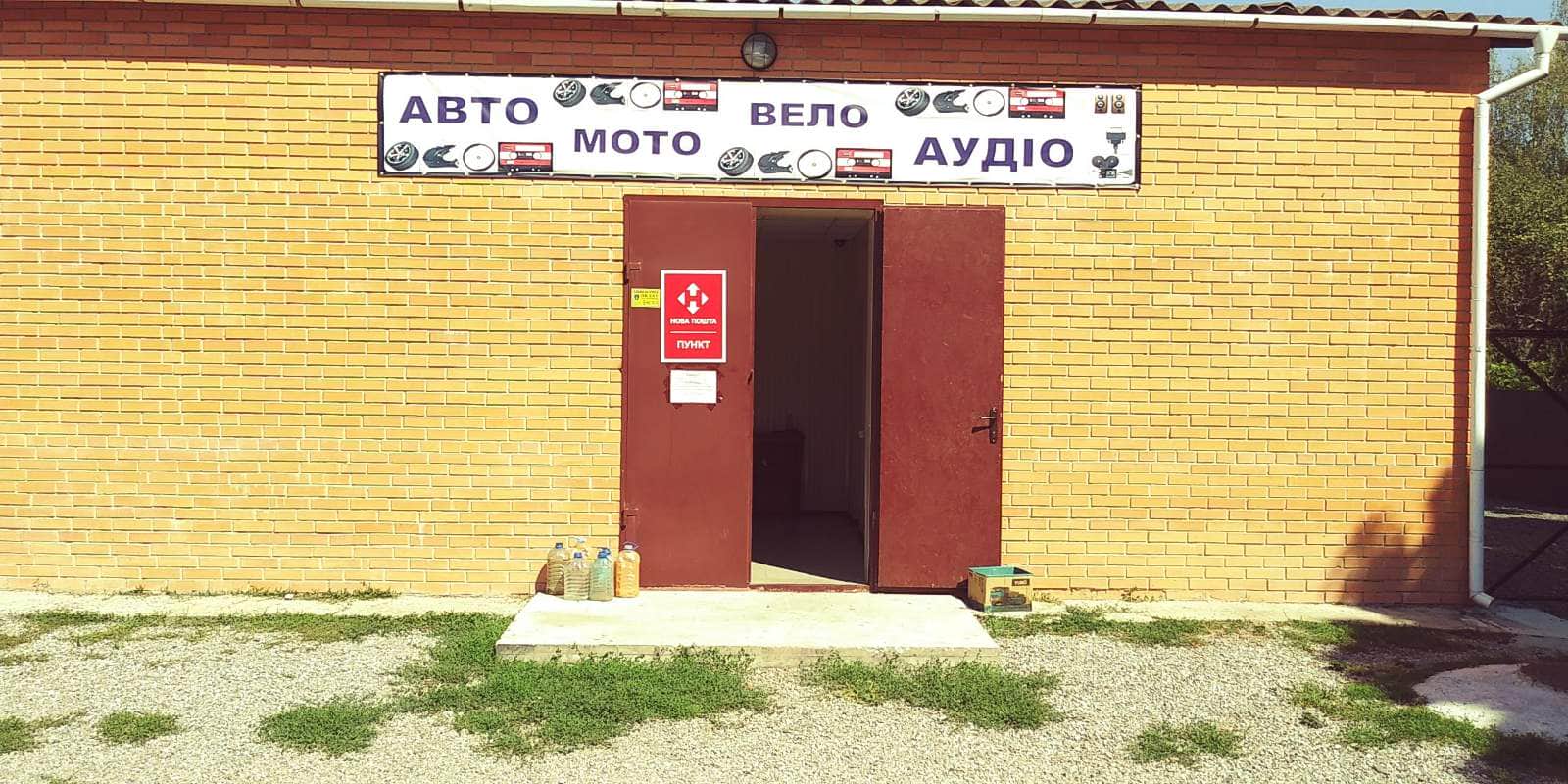 Yaroslav Dziubenko's store and post office.
Yaroslav Dziubenko's store and post office.
This is what it looked like before the full-scale invasionPhoto from Valentyna Dziubenko's archive.
"On 28 February, my son came home, he wanted to take a shower. He had a bad cold," says Valentyna. "Then the guys called him and said the Russian troops had arrived. And he immediately went out.
We could hear terrifying sounds of shooting. We started calling Yaroslav, but he never picked up." As the investigation later showed, the territorial defence group members hid in the premises of the store.
The Russian occupiers discovered them and took them down to the basement. They were interrogated and then shot. There is a rumour that the occupiers were pointed in the right direction by a man who had appeared in the village just a few days before the occupation.
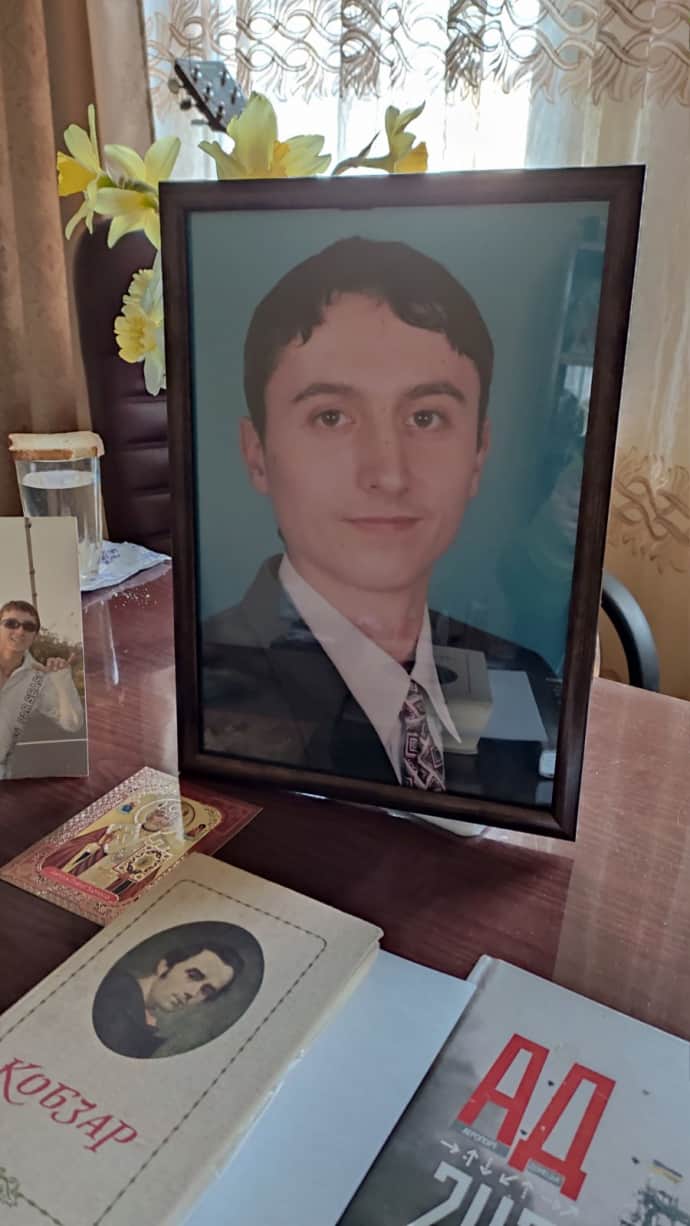 In Yaroslav's room, his parents have made a memorial corner with a photograph of him and his favourite booksPhoto from Valentyna Dziubenko's archive
In Yaroslav's room, his parents have made a memorial corner with a photograph of him and his favourite booksPhoto from Valentyna Dziubenko's archive
Subsequently, other men were brought to the basement and executed.
Then the occupiers threw explosives down there, and later the building was shelled. It was two weeks before locals were able to retrieve the bodies. Nine villagers volunteered for this grim task.
The remains were badly disfigured, without limbs. They were packed in bin bags and buried in a mass grave. An exhumation was carried out on 7 April, after the village had been liberated from Russian occupation, and the bodies were finally taken to the morgue.
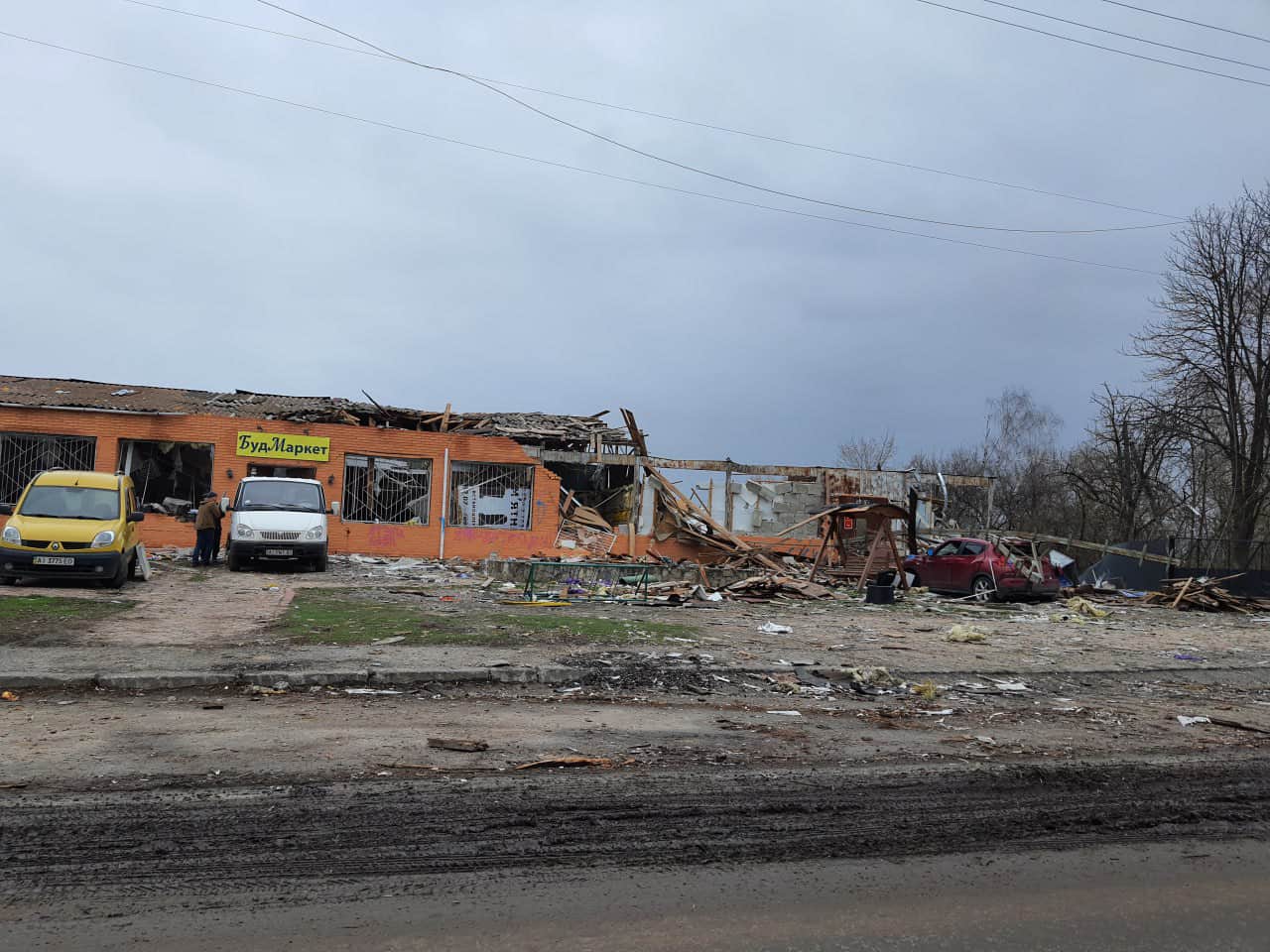 The store where Peremoha locals were killed following an explosion.
The store where Peremoha locals were killed following an explosion.
Shortly afterwards, the debris was cleared awayPhoto from Olena Palyvoda's archive.
As well as Yaroslav Dziubenko, the occupiers executed his cousin, 24-year-old Dmytro Koval. "Dimchyk was my favourite nephew," Valentyna says. "He was such a lovely boy. He often used to visit me - 'How are you doing, Auntie Valya?' he'd ask.
He never refused to help me, he'd always lend a hand - either in the vegetable garden or in the yard."
"Could you step outside? This bag won't fit in the coffin - we have to open it"
Ruslan Kulyk, 28, was also trapped in the basement on that tragic day. His parents managed to get out of the village after the tragic events.
They did not know for sure what had happened to their son. His mother, Larysa Kulyk, returned to Peremoha on 6 April [after the village had been liberated], and on the 11th, she buried her son in the cemetery. The morgue almost gave her the wrong body.
"The employee got out this bag labelled 'Kulyk, Ruslan' and said: 'Could you step outside? This bag won't fit in the coffin. We have to open it.' I stayed.
They began to tear the bag open, and there were these feet in combat boots. Ruslan never wore boots like that. When they opened the bag up completely, I saw that it was not my son..." Larysa says.
She began to search for her son's body in the coffins that had already been loaded into the car. She found him under the name of Dmytro Koval. She recognised Ruslan by his sneakers - she'd bought them for him.
Ruslan was good at mathematics at school, his mother recalls. From seventh grade, he worked with his father on construction sites. He knew how to repair equipment.
When he left school, he trained to become a salesman. At 20 he got married, and soon afterwards his son Matvii was born. Ruslan had recently been working as a sports product salesman.
"He was so friendly. People used to say that get-togethers would be boring until Ruslan turned up... I loved my son so much," Larysa says.
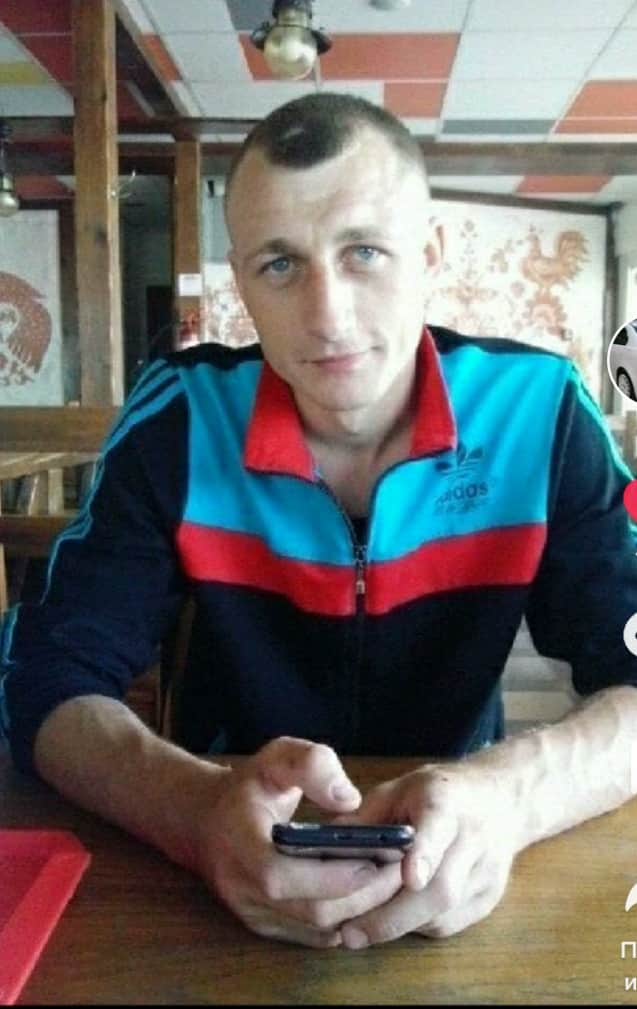 Ruslan Kulyk and his father helped make Molotov cocktails in Peremoha during the first two days of the full-scale warPhoto from Larisa Kulyk's archive.
Ruslan Kulyk and his father helped make Molotov cocktails in Peremoha during the first two days of the full-scale warPhoto from Larisa Kulyk's archive.
"I sensed that he was dead"
Oleksandr Palyvoda, 46, bought a house in Peremoha in the autumn of 2021 and moved here with his family from Kyiv.
"When the full-scale war started, we never thought to leave," says Oleksandr's wife, Olena. "On the contrary, people were fleeing the city to the countryside. My husband joined the self-organised territorial defence group on 25 February. On 28 February, someone from the army blew their car up on a mine.
At noon, my husband came to get some tools from the garage to help them tow the car. And at three o'clock he called me and told me to hide in the cellar because a Russian convoy was coming. He was returning home by road.
It seems he was spotted there by Russian vehicles. They pulled Oleksandr out of the car and took him to the post office. At 10 pm, one of our boys from there sent his mother his last text: 'They found us'."
Olena did not know that her husband was in the basement too. After he disappeared, she began to look for him through acquaintances and social media. "We were new to the village, so the locals couldn't figure out for a long time who my husband's body belonged to.
I didn't find out until a month later... although I sensed that he was dead. Sometime on the second night after Sashko's death, I had a dream. We were celebrating New Year's Eve, and all his friends were there, but it turned out that it wasn't a New Year's Eve party but a wake.
His mother dreamed about him too. She called me and said: 'I think Sasha is gone'," Olena says.
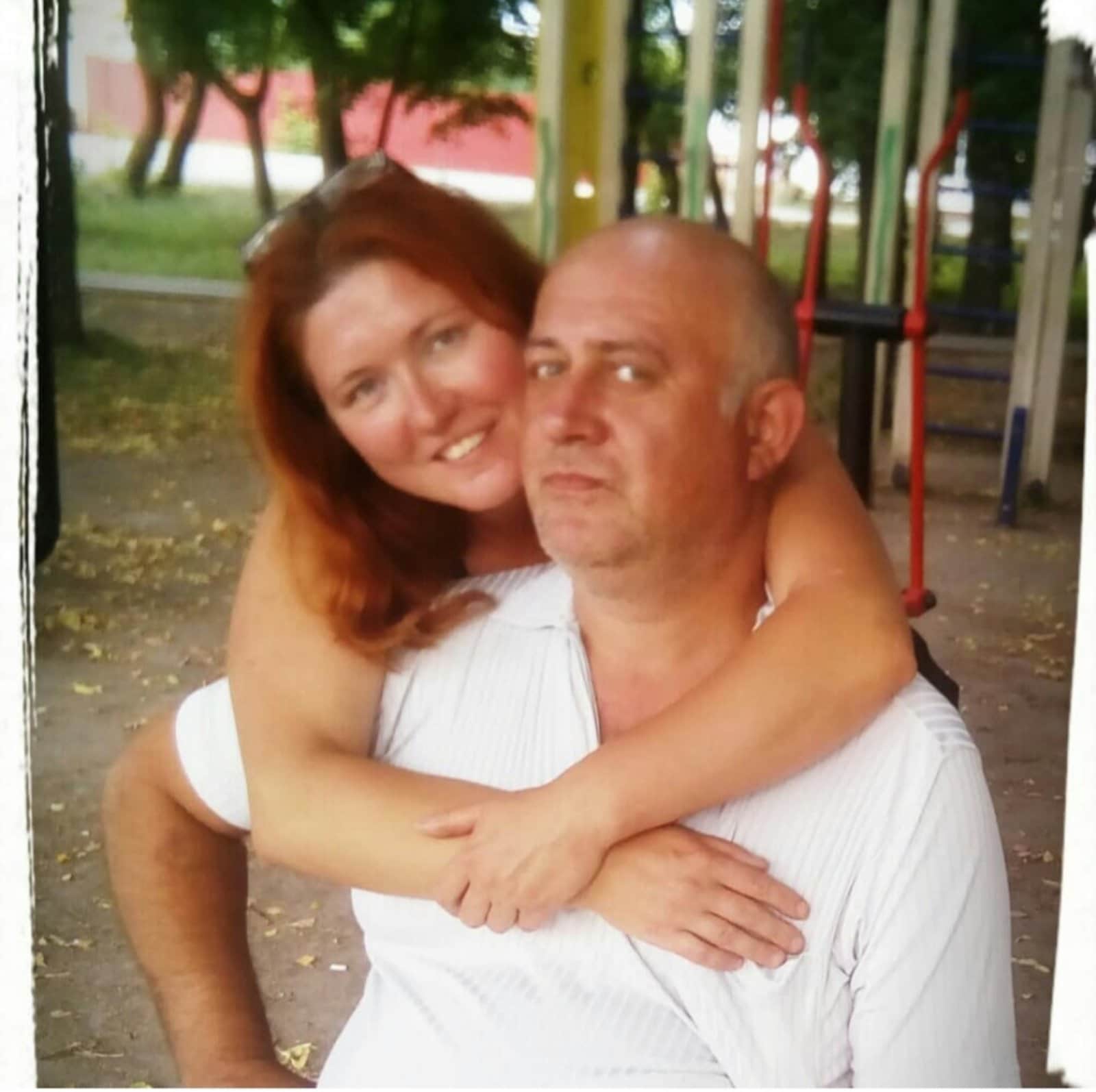 Oleksandr Palyvoda with his wife Olena. They moved to Peremoha from Kyiv shortly before the start of the full-scale warPhoto from Olena Palyvoda's archive.
Oleksandr Palyvoda with his wife Olena. They moved to Peremoha from Kyiv shortly before the start of the full-scale warPhoto from Olena Palyvoda's archive.
Oleksandr had a degree in construction design.
He had been working as a courier, delivering pizza. He was also a taxi driver for a long time. Olena met Oleksandr through work - she was a dispatcher.
"We used to talk on the phone or walkie-talkie. Sashko was very fond of joking around and teasing. Once, on New Year's Eve, I was on my way to work - his friend was giving me a lift in his taxi, and he called Sashko and suggested we have coffee together.
That was the first time I met him in person. After that, we were together for 16 years. Sasha was a real man.
I felt safe and protected with him - he was my rock. He loved doing building work. That's why we bought an unfinished house in the village, so we could do it up the way we wanted it.
But we never got to do that," Olena says.
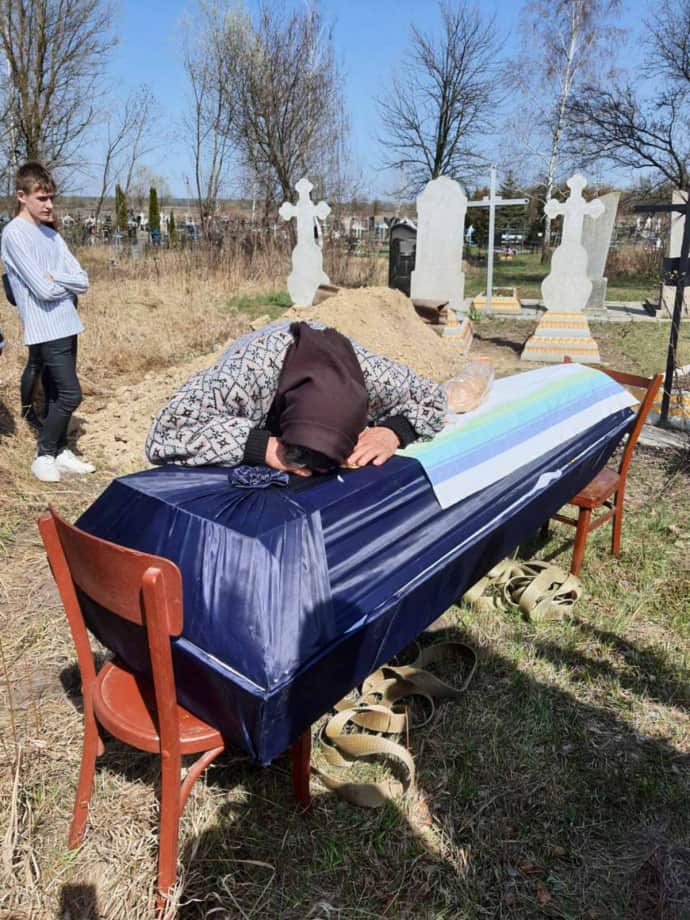 The funeral of Oleksandr Palyvoda. His wife learned of his death a month laterPhoto from Olena Palyvoda's archive.
The funeral of Oleksandr Palyvoda. His wife learned of his death a month laterPhoto from Olena Palyvoda's archive.
"They had no weapons, nothing"
On 28 February, Serhii Yareshko, 45, was at a roadblock. His daughter, Kateryna Postol, called him and asked where he was.
"They had no weapons, nothing," says Kateryna. "Perhaps they'd seen videos on the internet of Ukrainians lying down in front of tanks, trying to stop them, and believed in themselves... 'God is with us. Everything will be fine' was the last thing I heard my father say...." Serhii Yareshko was divorced and lived with his sick mother, whom he looked after.
She died a few days after his reburial. Serhii worked as a security guard. He loved poetry, and was a poet himself as well as a nature photographer.
"He liked talking to people and philosophising, and he was interested in history," says Kateryna. "As a father, he always tried to give good advice. He never said no when I needed his help. He would have given me and my sister the shirt off his back.
He missed us because we don't live in Peremoha, and he was always asking us to come and visit."
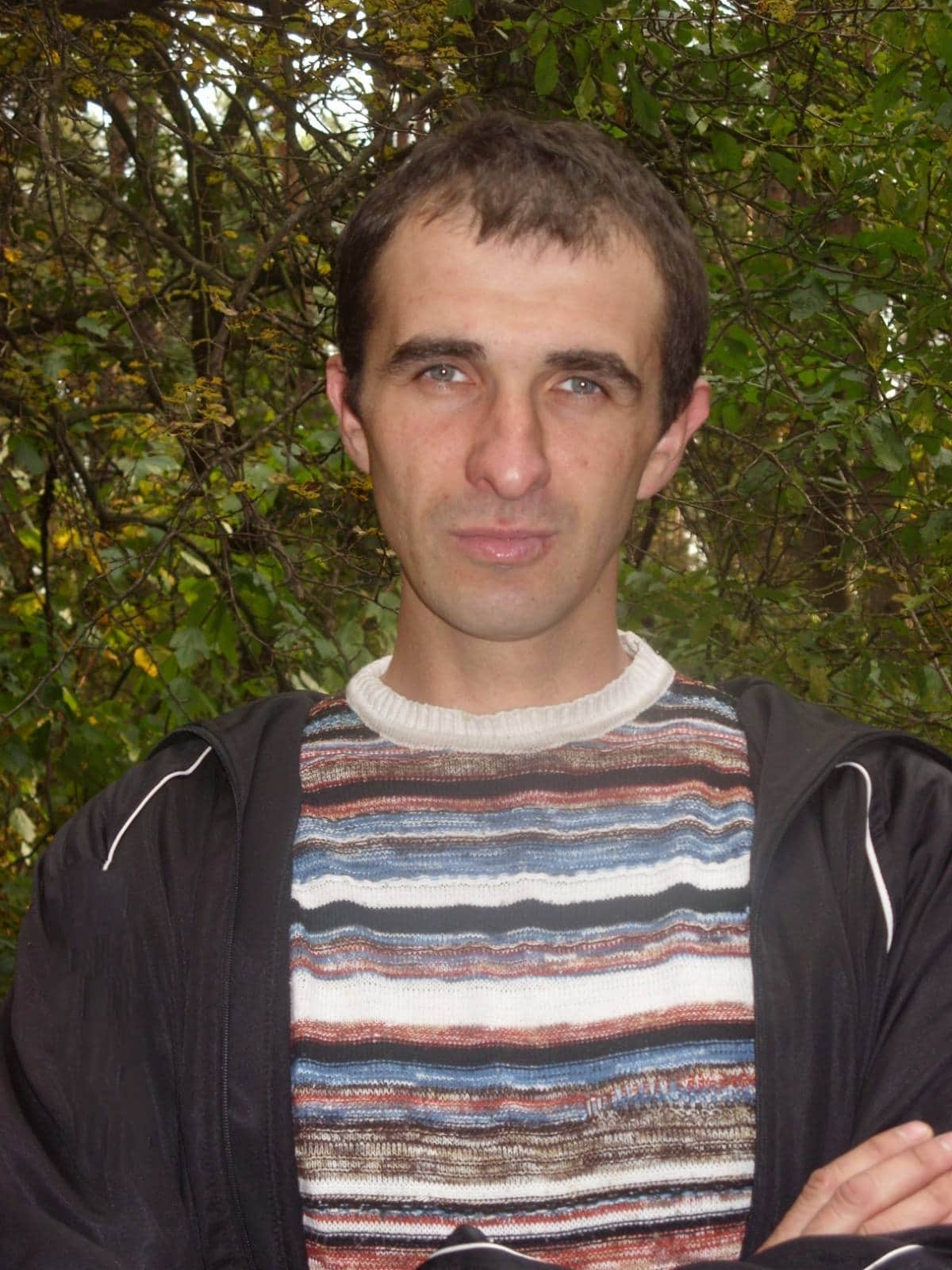 Serhii Yareshko's daughter recognised his body by his overalls. It was badly disfigured after the explosion in the basementPhoto from Kateryna Postol's archive.
Serhii Yareshko's daughter recognised his body by his overalls. It was badly disfigured after the explosion in the basementPhoto from Kateryna Postol's archive.
"DNA was taken, but we never received the results. That's how we buried him"
When the full-scale war began, 40-year-old Ivan Tretiak received a phone call from his uncle telling him that his granddaughter had died.
After the funeral, Ivan planned to go to Sloviansk, where his ex-wife and daughter lived. He wanted to drive them to the western regions of Ukraine. "But he called me and said that his cousin Yurii [the dead girl's father - ed.] was in a bad way, so he was going to stay with him for another day," says Ivan's mother, Olena Tretiak. "So Vania didn't have time to leave the village, because we ended up being occupied."
Ivan's uncle's family home is in the centre of Peremoha, where the Russian military vehicles were concentrated. When Ivan decided to go home, he - together with his brother and uncle - was shot by the occupiers. They tied up their hands and led them through the village to the post office basement.
Ivan's uncle managed to escape during a sudden firefight. Ivan and his cousin were shot in the basement on 1 March. Six weeks later, his mother was summoned to the morgue to identify him.
"The investigator didn't show me the remains. He showed them to my brother's wife. They could only be recognised by certain items.
Then they just gave us a bag. DNA was taken, but we never received the results. That's how we buried him.
There is a grave, we go there and remember him," says Olena almost two years after the tragedy.
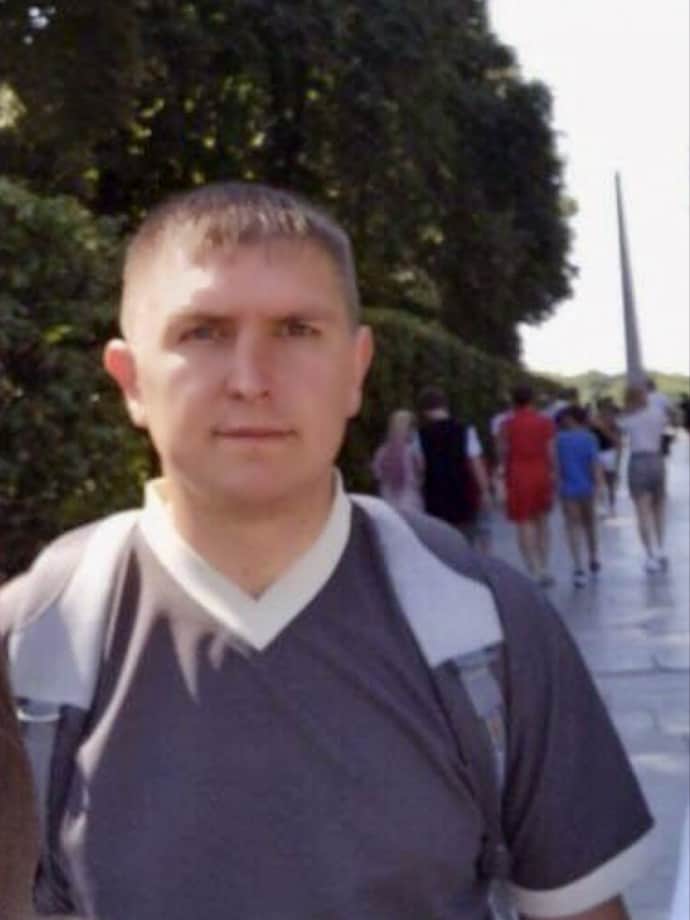 Ivan Tretiak came into the occupiers' sights by accident when he was visiting relatives in the centre of PeremohaPhoto from Olena Tretiak's archive.
Ivan Tretiak came into the occupiers' sights by accident when he was visiting relatives in the centre of PeremohaPhoto from Olena Tretiak's archive.
Ivan specialised in installing fire alarms, and recently he had started installing stretch ceilings. He was divorced, but he and his ex-wife still had a good relationship, his mother says. "Vania was so kind and gentle - he was my world.
He had a real zest for life. He had lots of friends. He liked cooking.
I'd come from work, and he'd be waiting with dinner ready - he used to make flowers out of courgettes... He always met me at the bus stop from work. How can you get through something like this?
And yet somehow, my husband and I have to keep on living in this world," Olena says. Ivan's cousin, Yurii Krasnozhon, 34, had trained at the forestry technical school in Lubny. He worked as an express driver.
"For me, he was the best person ever. I will never be able to get over his death," Yurii's mother Lidia says, in tears.
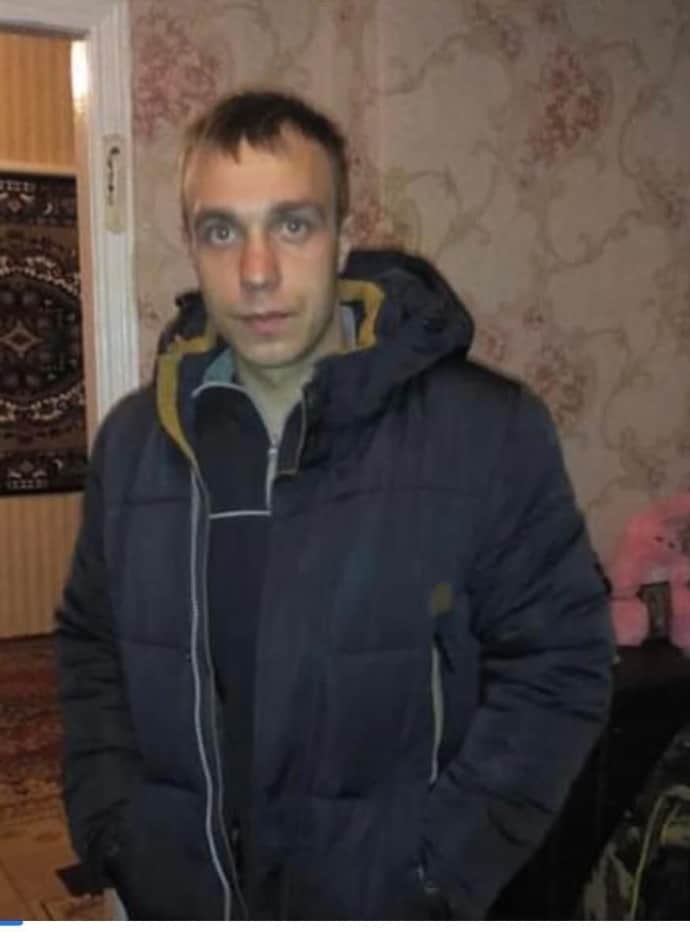 On the first day of the war, Yurii Krasnozhon's only daughter died. A few days later, he was shot by the Russians
On the first day of the war, Yurii Krasnozhon's only daughter died. A few days later, he was shot by the Russians
How does the village preserve the memory of those killed by the Russian occupiers?
On 30 March, the day Peremoha was liberated from the Russian occupiers, representatives of the local authorities and family members of the victims lay flowers on their graves.
The mayor of the village, Nataliia Derkach, says that she had the idea of erecting a monument at the place where they were executed. However, as the area is private property, talk of memorialisation has stopped for now. The ruined part of the premises was cleared and the basement was filled with concrete.
A store is now open in the part of the building that remained intact.
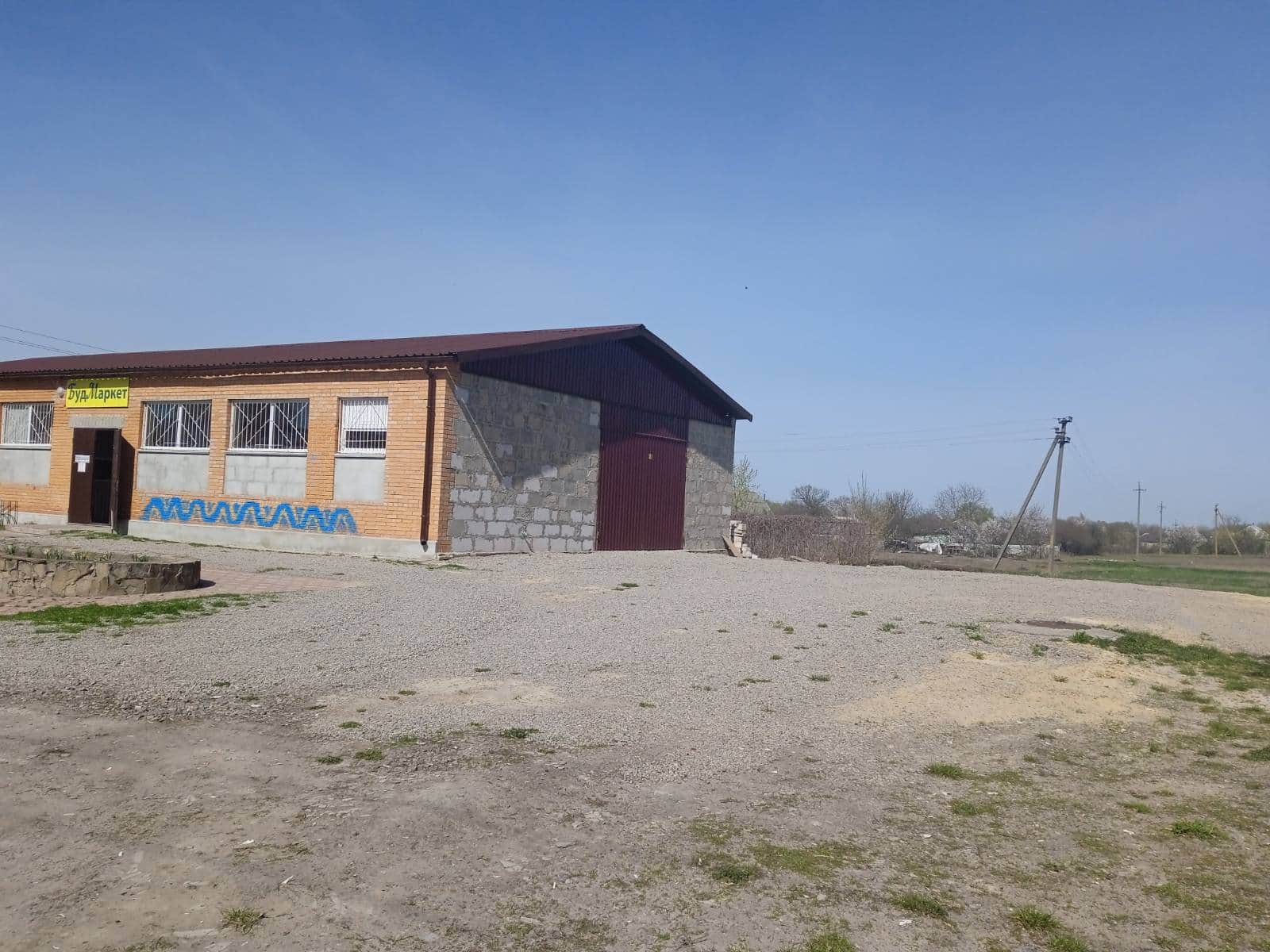 Photo 9: The ruins of the destroyed store in Peremoha were cleared away. The basement from which the bodies of the villagers were retrieved was concreted. A building materials store operates in the surviving part of the buildingPhoto from Nataliia Derkach's archive.
Photo 9: The ruins of the destroyed store in Peremoha were cleared away. The basement from which the bodies of the villagers were retrieved was concreted. A building materials store operates in the surviving part of the buildingPhoto from Nataliia Derkach's archive.
Meanwhile, the Kyiv Oblast Prosecutor's Office is conducting a pre-trial investigation into the atrocities committed in Peremoha.
The accused are the commander of the motorised rifle brigade of the 15th separate motorised rifle brigade of the 2nd Guards Combined Arms Army of the Central Military District of the Russian Armed Forces and the assistant commander for physical training of the same military unit. They are accused of ordering the ill-treatment of eight civilians, killing five of them, and killing another two civilians. Surprisingly, the occupiers let one captive go.
The villagers say that he was freed because he was not a local, but had ended up stranded in Peremoha by accident when he could not get home to Sumy Oblast in the first few days of the war.
Hanna Balakyr
Editing: Teresa Pearce